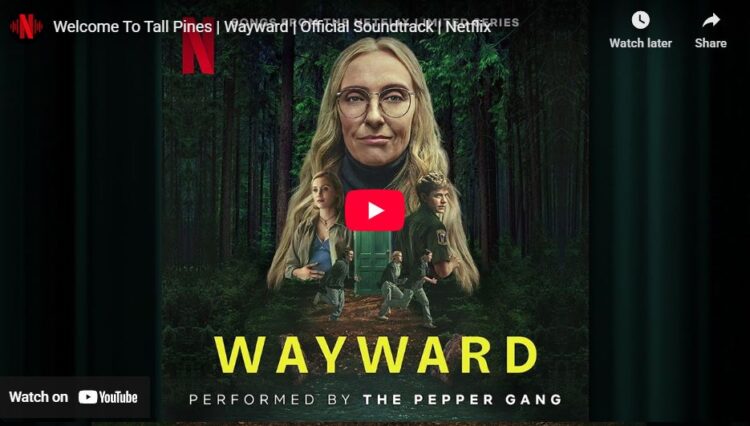Marie-Hélène L. Delorme was watching from afar while the Canadian series Wayward was climbing to the top of the Netflix most-viewed list. Her music serves as an invisible binding agent between the fear, tenderness and strangeness that make up the images of a fictitious America, full of secrets and murky forests. “It’s a very peculiar project when it comes to the notion of time,” says Delorme. “The main challenge was creating its specific universe, but with an extremely wide emotional range.”
 Mystery, horror, teenage comedy; Wayward (starring Toni Collette) flirts with a multitude of genres, in the confident state of a lucid dream. For Delorme, also known as Foxtrott, the challenge was to strike a fragile balance: letting the music thread its way through the story, without being swallowed by its sharp turns.
Mystery, horror, teenage comedy; Wayward (starring Toni Collette) flirts with a multitude of genres, in the confident state of a lucid dream. For Delorme, also known as Foxtrott, the challenge was to strike a fragile balance: letting the music thread its way through the story, without being swallowed by its sharp turns.
“It’s not horror-horror,” she says. “The tone of the music is constantly changing, getting increasingly darker and fucked up. Yet, it had to remain cohesive, with recurring melodies that carried different intentions.”
The score she delivered is one that breathes, where the tension sets in through tiny doses of peculiarity. “I wanted to create a huge mood for the series, a soundscape that could contain every teenage emotion,” she says. The result is a psychedelic, organic canvas, with flutes and natural sounds – frogs, notably – that she recorded herself. “I worked with sounds from nature that I made unrecognizable,” says Delorme. “It was quite fascinating making them evolve to the point where they lost their very origin.”
Becoming part of a world-class production also means accepting the slow pace, the complexity, and the hierarchy of such an endeavour. “You have to go in with a delicate balance between confidence and openness,” she says. “It’s very collaborative.” Mae Martin and the Netflix team offered her a rare kind of workspace, one where high standards met human warmth. “The Netflix people were superb,” says Delorme. “The notes they gave were always geared toward making things better. It’s tough, but it’s also amazing.”
This support also extends to her professional entourage. Since she’s joined Free Run Artists, the agency run by Kim Neundorf (in which Cristobal Tapia de Veer also works), Delorme feels supported artistically, and on a human level. “I clicked with Kim on a personal and musical level right from the start, and that’s quite rare and precious,” she says. “The realm of screen composing is quite complex, inasmuch as you need someone who represents you, negotiates on your behalf, but who can also listen.”
She was asked to deliver musical sketches before she even saw the first rough cuts. It’s a risky approach, but also quite liberating. “It’s fun, ‘cause you can go straight to the essence of it,” she says. “You don’t have to worry about timing, and other constraints. You can create tons of music that might never be used, but at least it lets you explore your imagination.”
This intuitive approach gives birth to sounds that, later on, find an exact spot within the image. “There’s something ironic in screen composing,” says Delorme. “When the music is perfect for the scene, it’s like it’s not even there, but if the music isn’t good, everything falls apart.”
Between the back-and-forth, the revisions, and the pressure of the first episodes, she admits that she sometimes lost track of time. “I finished the heavier episodes in impossible time; I don’t even remember composing them,” she admits with a chuckle.
The music of Wayward carries a deliberate oddity – a bold streak that ruffles the surface of the narrative, and Delorme is proud of that. “I’m elated that the music is weird,” she says. “If it had been more normie, it would’ve stripped away a few layers of complexity from the story, I think.”
This unique sonic identity is a reflection of her own path. “I come from the dark side, the indie world,” she says. “It feels weird to hear my music in such a mainstream context, but I’m very grateful. It’s my special sauce added to something mainstream.”
Before getting into screen composing, Delorme studied screenwriting, sound recording, and music production; that varied background is now converging into a single point. “Without that baggage, even just five years ago, I could not have worked on this project. Everything I’ve learned is useful in this context,” she says.
That versatility also feeds her creative freedom. Because Delorme’s personal projects exist in their own right, she’s able to fully shape herself around each new assignment, and serve it entirely without the need to smuggle her own artistic ideas into places where they don’t belong. “I compose, I produce, I mix, but II also have my personal projects, where there are no compromises, and that makes me a better collaborator,” she says. Everything in its proper place.
The series’ success has left a strange emptiness in its wake, because of how all-encompassing the project was for awhile. Delorme’s mind is still buzzing as she thinks about what’s next. “I’m still recovering from the whirlwind,” she says with a laugh. “But one thing’s for sure: something new is coming soon, and sooner rather than later.”
In her voice, you can hear the dizzying sense of having touched something that can’t be tamed. In this dialogue between frogs and machines, she found her own reflection; a place where dissonance becomes truth.
